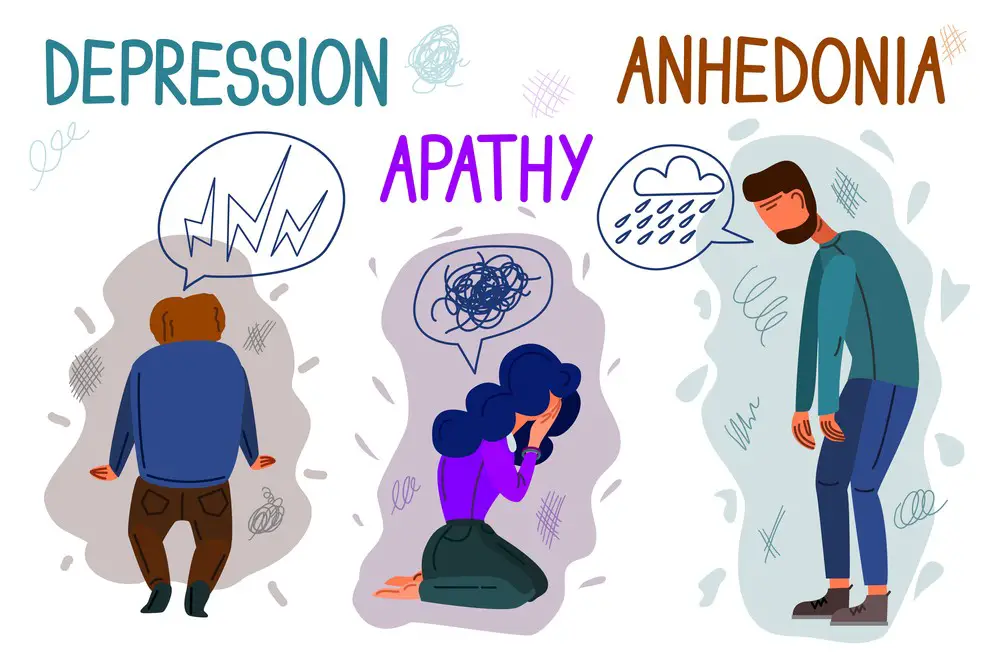As a BetterHelp affiliate, we receive compensation from BetterHelp if you purchase products or services through the links provided
Ambien, a popular prescription medication for insomnia, has been the subject of debate due to its potential side effects. Many patients have experienced relief from sleeplessness through its use; however, concerns have been raised regarding the possible correlation between Ambien and depression. Analyzing this connection is essential to understanding the benefits and risks associated with this medication.
As a sedative-hypnotic drug, Ambien functions by depressing the central nervous system to induce sleep. While this mechanism effectively treats transient and chronic insomnia, it can also produce undesirable side effects. One of the potential consequences of using Ambien is the development or exacerbation of underlying mental health issues, including depression.
Key Takeaways
- Ambien is a commonly prescribed medication for insomnia, but its effects on mental health, such as depression, are debated.
- The sedative-hypnotic nature of Ambien can result in unintended side effects, including memory problems and potential dependence.
- The FDA has imposed strict regulations on Ambien due to its potential risks and side effects.

Understanding Ambien
Ambien, also known as Zolpidem, is a sedative-hypnotic medication commonly prescribed for the short-term management of insomnia. It works by depressing the central nervous system, allowing individuals struggling with sleep difficulties to fall asleep quicker and stay asleep longer. Ambien is available in various forms, such as tablets and oral spray, and is typically taken before bedtime.
As a sedative-hypnotic, Ambien affects the neurotransmitter GABA (gamma-aminobutyric acid) in the brain. GABA is responsible for inhibiting neuron activity, ultimately promoting relaxation and sleep. Ambien enhances the effect of GABA, which can lead to a feeling of calmness and drowsiness.
Although Ambien can be an effective short-term solution for insomnia, it is important to consider potential side effects and their impact on mental health. Some users may experience negative effects, such as an increased risk of depressive symptoms or mood changes. Always consult with a healthcare professional before starting or stopping any medication, including Ambien.
Ambien and Insomnia Treatment
Ambien, also known as Zolpidem, is a medication commonly prescribed for insomnia. Insomnia is a sleep disorder that affects a person’s ability to fall or stay asleep, often leading to daytime fatigue, irritability, and difficulty focusing.
Physicians typically prescribe Ambien for short-term use, as it can be effective in helping individuals with sleep disorders to achieve a restful night’s sleep. This medication works by enhancing the activity of GABA, a neurotransmitter that facilitates sleep and relaxation in the brain. As a result, Ambien can promote sleep onset and maintain sleep throughout the night.
It is important to note that Ambien should only be used under the supervision of a healthcare professional, as it carries a risk of dependency. Patients with a history of substance abuse or other medical conditions should be carefully evaluated before being prescribed this medication. Additionally, following the prescribed dosage instructions is crucial, as excessive use may lead to adverse side effects or exacerbate existing health issues.
While Ambien can be an effective treatment option for insomnia, it may not suit those suffering from sleep disorders like sleep apnea. Sleep apnea is characterized by disruptions in breathing during sleep, which can lead to a lack of oxygen and interrupted sleep patterns. In such cases, alternative treatment methods, such as continuous positive airway pressure (CPAP) therapy or lifestyle modifications, may be more appropriate.
In conclusion, Ambien serves as a viable option for the short-term treatment of insomnia but should only be utilized under the guidance of a healthcare professional. Addressing the underlying causes of sleep disorders, such as sleep apnea or other health issues, may require alternative therapies or medical interventions.

Potential Side Effects of Ambien
Ambien can cause various side effects that users should be aware of. Some common side effects include headache, nausea, dizziness, dry mouth, sleepiness, and drowsiness. These side effects are typically mild and may lessen as the body adjusts to the medication.
In rare cases, Ambien can cause more serious side effects, such as diarrhea, allergic reaction, or rash. If any of these symptoms occur, contacting a healthcare provider is essential. They can determine whether it is appropriate to continue using the medication or adjust the dosage.
It is important to note that the side effects listed above are not exhaustive, and individuals may experience other side effects. Moreover, each person may experience side effects differently, so monitoring and reporting any concerning symptoms to a medical professional is crucial. In some cases, Ambien might also contribute to or exacerbate symptoms of depression. Users should be aware that depression is not a definitive side effect of Ambien, but discussing this potential risk with a healthcare provider is essential.
Adhering to prescribed dosages and following the healthcare provider’s instructions can minimize the risk of side effects from Ambien. Observing any bothersome or unexpected symptoms will help ensure the safe and effective use of the medication.

Mental Health Implications
Ambien has been known to cause a variety of mental health implications in some individuals. Among these potential side effects, depression concerns both patients and healthcare providers.
Although Ambien primarily addresses insomnia and promotes a restful night’s sleep, it may sometimes lead to trouble sleeping or exacerbate pre-existing sleep disorders in certain cases. This can negatively impact mental health, as adequate sleep is crucial in maintaining emotional well-being.
Besides depression, some individuals may experience heightened anxiety and stress levels while using Ambien. During treatment, individuals must be aware of these potential side effects and communicate any changes in emotions or mental health to their healthcare provider.
Suicidal thoughts have also been reported in rare cases as a side effect of Ambien use. While this is uncommon, it emphasizes the importance of monitoring one’s mental state during treatment and seeking immediate assistance if such thoughts emerge.
The relationship between Ambien and mental illness is complex and can vary from person to person. Most individuals respond well to the medication and experience positive sleep patterns and overall mental health outcomes. However, individuals with pre-existing mental health conditions, such as depression or anxiety, should exercise caution and work closely with their healthcare provider to determine the most appropriate treatment plan.
In conclusion, although Ambien can be an effective solution for individuals with sleep disorders, it is crucial to be informed about its potential mental health implications. By staying vigilant and communicating openly with healthcare providers, most individuals can find the right balance between the benefits and risks of using Ambien.
Ambien and Memory Issues
Ambien has been known to cause memory issues in some individuals. It is important to understand the potential risks associated with this medication and the benefits it can provide for those struggling with sleep disorders.
One of the main side effects of Ambien is memory impairment, including memory loss or amnesia. Individuals who take this medication may experience difficulty recalling events or details, particularly during the hours immediately following Ambien use. While the severity of memory problems can vary among users, cases of temporary amnesia have been reported.
In addition to memory loss, Ambien may also contribute to cognitive issues. These can include confusion, disorientation, and difficulty concentrating. These effects are especially concerning for individuals with a history of cognitive challenges or at an increased risk of developing cognitive impairments due to age or other factors.
Cognitive behavioral therapy (CBT) is a potential alternative for addressing sleep issues with Ambien. CBT focuses on identifying and modifying unhelpful thoughts, behaviors, and emotions related to sleep problems. This therapy effectively treats various sleep disorders and may provide a safer alternative for individuals concerned about potential memory issues or cognitive side effects.
In conclusion, it is essential for individuals taking Ambien or considering using it for sleep-related issues to weigh the potential risks and benefits. While the medication can help address sleep disorders, it’s crucial to be aware of the possible memory issues and cognitive side effects that may arise. By discussing concerns with a healthcare professional and exploring alternative options like cognitive behavioral therapy, individuals can make informed decisions about their sleep treatment and avoid potential risks associated with memory impairment.
Risks of Dependence and Addiction
Ambien can potentially cause dependence and addiction in some individuals. Prolonged medication use may increase tolerance, requiring a higher dosage to achieve the desired effects. As a result, physical and psychological dependence may develop.
Withdrawal symptoms can occur if an individual stops using Ambien abruptly. These symptoms may include insomnia, anxiety, irritability, and in severe cases, seizures. Those discontinuing Ambien must work closely with their healthcare providers and follow a tapering plan to minimize the intensity of withdrawal symptoms.
Rehabilitation programs are available for those struggling with Ambien addiction. These programs provide support and medical supervision to help individuals detoxify and maintain sobriety safely. Cognitive-behavioral therapy and other counseling approaches are often used in conjunction to address the underlying causes of addiction and promote lasting recovery.
It is essential for patients prescribed Ambien to take the medication only as directed and to communicate openly with their healthcare providers about any concerns or adverse effects they experience. By doing so, they can minimize the risks of developing dependence and addiction while effectively addressing their sleep disturbances.
Negatively Impacted Activities
Ambien, a widely prescribed medication for insomnia, may affect various aspects of an individual’s life. This includes their ability to perform daily tasks, function in the workplace, and maintain relationships. This section will explore how Ambien can negatively impact activities such as walking, driving, job performance, sleep driving, and relationships.
Ambien use can adversely affect walking and driving, two essential aspects of everyday life. Some users may experience dizziness, drowsiness, or impaired coordination due to the medication, making walking and driving dangerous. These side effects increase the risk of accidents and fall, leading to severe injuries or death. Furthermore, if taken improperly, Ambien can cause sleep driving, a condition where an individual drives unconsciously while still asleep, which endangers themselves and others on the road.
In the workplace, Ambien may disrupt an individual’s job performance. The drug’s lingering side effects, such as memory impairment and drowsiness, can make it difficult to concentrate and complete tasks efficiently. Furthermore, users may struggle with decision-making and problem-solving, which are crucial for professional success. Employers may notice a decline in productivity, and coworkers may become frustrated with the user’s inability to perform at their best.
Lastly, Ambien can even impact relationships. The emotional side effects, such as depression or mood swings, may strain connections with loved ones. Since Ambien affects the user’s ability to communicate and engage in social activities, friends and family members may feel disconnected from the user. The medication’s adverse effects might also lead to a lack of fulfillment and satisfaction in romantic partnerships.
In summary, Ambien’s influence on walking, driving, job performance, sleep driving, and relationships can negatively affect an individual’s overall well-being. Accepting the potential risks and seeking professional guidance on medication use can help minimize the negative impacts on daily activities and improve the user’s quality of life.
Ambien and the FDA
In a confident, knowledgeable, neutral, and clear tone, one can discuss the relationship between Ambien and the FDA. Ambien, a prescription sleep aid, is approved by the FDA for short-term use. It is classified as a sedative-hypnotic that acts on the brain to promote relaxation and sleepiness.
The FDA has continued to monitor the safety and efficacy of Ambien over the years. It is indicated for the short-term treatment of insomnia, typically recommended for use for no longer than a few weeks. This is due to the potential for dependence and adverse effects, especially when used for extended periods.
While Ambien is not specifically linked to causing depression, the FDA has noted that individuals taking the medication may experience side effects that include changes in mood, such as depression, anxiety, or aggression. These side effects may differ between individuals and should be discussed with a healthcare professional if they occur. The FDA also advises against using Ambien in those with a history of depression or other mental health disorders, as it may exacerbate these conditions.
For those using Ambien, the FDA provides guidelines to minimize potential risks. This includes ensuring the medication is taken as directed by a healthcare professional, with the lowest effective dose prescribed for the shortest possible duration.
While the FDA has not directly linked Ambien to causing depression, it acknowledges potential mood-related side effects. It offers guidance to minimize risks associated with the medication’s use. The overall safety of Ambien is subject to ongoing monitoring by the FDA, which continues to update its recommendations based on emerging data and research.
Uncommon Side Effects of Ambien
Ambien may also cause some uncommon side effects that users should be aware of. Although these occurrences are rarer, patients must understand the potential risks of this medication.
Hallucinations can occur in some individuals while taking Ambien. This unusual perceptual experience might cause distress and confusion, especially when the affected person cannot differentiate between reality and hallucination.
In some cases, users may experience vomiting due to taking Ambien. While not typical, this reaction may indicate intolerance to the drug or a more severe problem, such as an overdose.
Agitation can be another uncommon side effect of Ambien. Users may feel restless, irritable, or unusually tense. It’s important to monitor one’s emotional state while on this medication and consult a healthcare professional if agitation arises.
Another rare but concerning consequence of taking Ambien is sleepwalking. This behavior might lead to potentially dangerous situations, as the individual is often unaware of their actions and surroundings during these episodes.
Patients might also experience fatigue as a result of using Ambien. This lack of energy or excessive tiredness may reduce one’s ability to perform routine tasks or diminish overall cognitive function.
In rare instances, Ambien users may encounter back pain. While the connection between the drug and this condition remains unclear, patients should consult their healthcare provider if they experience persistent or severe back pain while on the medication.
In some individuals, a rash may develop due to an allergic reaction to Ambien. Monitoring any skin changes and seeking medical advice if a rash appears is important.
Finally, although extremely rare, death has been reported in individuals using Ambien. This outcome is usually related to an overdose or a combination of Ambien with other medications that suppress the central nervous system. Patients should always follow prescribed dosages and avoid mixing Ambien with other substances without consulting a healthcare professional.
Physical Reactions to Ambien
Ambien can cause various physical reactions in men, women, and children. While many people experience relief from sleeplessness with this drug, some users can also encounter undesirable side effects.
Chest pain is one possible reaction to Ambien, which might alarm users. Swelling may also occur, typically affecting the face, lips, tongue, or throat. It is important for individuals experiencing these reactions to seek immediate medical attention, as they could potentially indicate an allergic response. Hives, another sign of an allergic reaction, may also be present.
Muscle pain can be a side effect experienced by some individuals on Ambien. While usually minor, it might become bothersome enough to warrant a conversation with a healthcare provider. Fainting, an infrequent yet concerning side effect, may occur as well.
Trouble breathing could be a serious reaction to Ambien, signaling that the individual should get medical help immediately. An irregular heartbeat is another potentially dangerous side effect some users may experience.
It is essential for individuals taking Ambien to monitor their physical reactions to the medication and report any concerning side effects to their healthcare providers promptly. Each person’s experience with Ambien may differ, and being aware of one’s reactions is vital to ensuring safe and effective treatment for insomnia.
Frequently Asked Questions
Does Ambien lead to next-day depression?
Ambien may lead to next-day depression in some individuals but not everyone. Reactions may vary based on the person’s mental health, dosage, and how their body processes the medication. If experiencing next-day depression, it’s advised to consult a doctor.
Can long-term Ambien use impact mental health?
Yes, long-term Ambien use can impact mental health. Prolonged usage can lead to dependence, potentially worsening mental health conditions. Following prescribed guidelines and discussing concerns with a healthcare professional is important.
Are mood changes common side effects of Ambien?
Mood changes can be a side effect of Ambien use but are not considered common. Users may experience irritability, agitation, or confusion. It’s important to keep track of any such changes and inform a doctor if they persist or worsen.
Does Ambien use affect anxiety levels?
Ambien can potentially increase anxiety levels in some individuals, either due to rebound insomnia or as an adverse reaction. Monitoring one’s emotional state and seeking medical advice if anxiety levels rise significantly during treatment is essential.
Do elderly users experience exacerbated depression due to Ambien?
Elderly users may be more vulnerable to exacerbated depression from Ambien use, as they tend to be more sensitive to the drug’s effects. Doctors may prescribe lower doses or alternative medications for elderly patients. Regular monitoring and communication with a doctor are crucial.
Can Ambien heighten anxiety the following day?
Ambien can heighten anxiety levels the following day for some users, particularly if the medication has not been adequately metabolized. Rebound insomnia and next-day drowsiness can contribute to heightened anxiety. Consult a healthcare professional if feelings of anxiety persist.
- 3 Ways Wearing a Hat Can Help Lower Your Stress Levels - April 19, 2025
- Breaking the Silence: Why Men’s Mental Health Matters More Than Ever - April 15, 2025
- How to Transform a Home’s Patio Space into a Relaxing Space - March 23, 2025
This site contains affiliate links to products. We will receive a commission for purchases made through these links.



